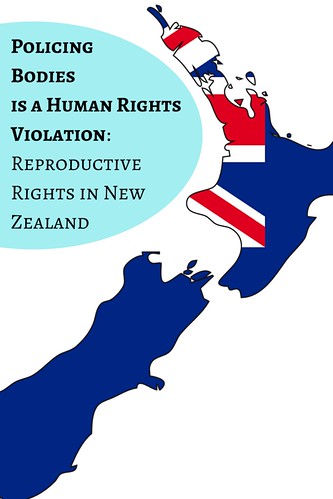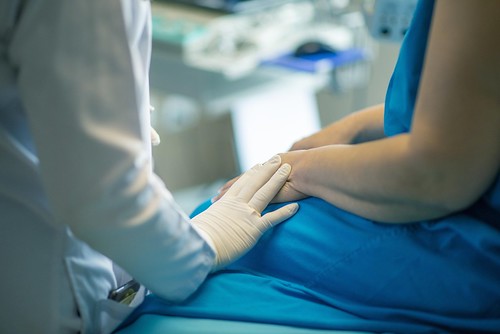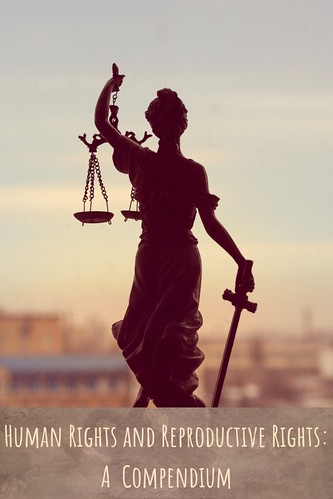Policing Bodies is a Human Rights Violation: Reproductive Rights in New Zealand
With over 5 million residents, and with 1.6 million people under the age of 25, reproductive rights in New Zealand are a crucial aspect of the wider healthcare system. Whilst in 2022, reproductive healthcare is considered to be a regulated part of the health service, to the extent that the residents of New Zealand are now able to obtain an abortion after a telephone consultation alone, it has not always been so easy.

In fact, a suggestion of loosening the regulations around accessing abortion services in New Zealand wasn’t suggested in Parliament until 2017, as a running mandate for none other than the current Prime Minister, Jacinda Ardern.
For New Zealand, the past few years have seen a monumental development for both reproductive human rights and for abortion rights.
New Zealand’s history of reproductive freedoms
Prior to a 2020 legislative amendment, if certain conditions weren’t met, abortion was a criminal offence. Circumstances that gave exceptions to this ruling included rape, incest, and ‘mental subnormality.' In any other situation, without a legally provided two-doctor approval and an agreement from both physicians that continuing the pregnancy would cause serious damage to the patient’s mental or physical health, abortion was criminalised under New Zealand’s Crime Act of 1977.

Those who were in opposition to amending the existing legislation to allow for a more open access policy regularly cited that since 2014, there has been an estimated 13,000 to 14,000 abortions performed in New Zealand, implying that abortion services were sufficiently accessible within the healthcare system. However, the process was problematic for several reasons, including:
In order to meet the conditions of accessing abortion services, a woman must first intentionally allow themselves to fall in to a place of significant mental or physical distress, the validity of which was then judged by a third party. This is in direct conflict with article 5 of the Universal Declaration of Human Rights which states that, ’No one shall be subjected to torture or to cruel, inhuman or degrading treatment or punishment’.
Additionally, the system strongly suggested a connection between using abortion services and committing a criminal act, the effect of which could cause serious mental and social impact to those utilising it.
The Abortion Legislation Act 2020
On March 24th 2020, Prime Minister Jacinda Ardern ushered in the first significant amendment to abortion legislations in New Zealand in over 40 years. The Abortion Legation Act 2020, which passed by 68 votes to 51, brought changes to many areas of reproductive care, with the aim ‘to reduce barriers to accessing abortion services'.

In addition to decriminalising abortion, and with the goal of better aligning reproductive freedoms with other aspects of the New Zealand’s health case service, the amendments made by the act include the introduction of:
* The ability to self-refer to an abortion service provider
* A wider range of registered health practitioners that can provide abortion services
* It is no longer a requirement for abortions to be performed in licensed premises
* There are no clinical or statutory requirements to access an abortion before 20 weeks
* Abortion post 20 weeks is available with statutory clinical requirements
* Whilst advised on availability, counselling is no longer mandatory
* The Ministry of Health holds a list of abortion service providers that is accessible to all people
The amendments that were made paved the way for a substantially greater enjoyment of reproductive freedoms within New Zealand, as well as a higher quality of human rights. Wilst the 2020 Abortion Legislation Act is enshrined in law, not all law-makers support it’s position, with several high ranking New Zealand politicians expressing opposing opinions. Upon the recent overturning of Roe v. Wade in the United States, National MP Simon O’Connor stated that “this is a good day,” a statement that Christopher Luxon, the opposition party leader, later requested that he remove, as it did not align with the party’s stance.
New Zealand’s reproductive rights in 2022
Two years on from the 2020 legislative amendment, New Zealand remains widely supportive of abortion rights, with a 2022 Ipsos poll indicating that 77% of citizens support a woman’s right to terminate a pregnancy, both in some or any circumstances.
Additionally, technological developments now allow for people to access reproductive health care services from their own home. Telehealth, a concept that also exists for abortion services specifically in Scotland, England, Wales, and Colombia, is the ability to have a full medical consultation over the phone. In the case of abortions in New Zealand, telemedicine services have established a direct hotline through which they will conduct a consultation for an early medical abortion. The service is available within the first 10 weeks of pregnancy, within which the medicines required to terminate the pregnancy can be sent via courier to your home.

With the service available 24/7, it is a significant step in the reduction of barriers faced by people accessing abortion services. Telemedical abortion hotlines combat issues including: travel, the safety of the person accessing abortion health care, the stigma they might face for doing so, and the mental wellbeing of the patient.
New Zealand Family Planning
One organisation working to support, maintain, and further reproductive rights in New Zealand is New Zealand Family Planning. Through fantastic work in a multitude of areas, they provide a range of services, including sexual and reproductive health information, training and educational programmes, and conducting their own research.

Family Planning New Zealand also strives to include all people, stating,
Who you are, where you live, and how much money you have should not affect your health, but it does. Family Planning is committed to promoting change across society, government and among health care providers to make sure all people have the chance to live a healthy life.
Dr. Frances Bird, the former Director of Health Promotion at New Zealand Family Planning, was incredibly kind to take the time to talk to me about her experiences working within reproductive health services there. Dr. Bird recently project managed the establishment of DECIDE - Aotearoa New Zealand's National Abortion Telehealth Service, an area that, as we have already established, has changed the course of reproductive health care within New Zealand forever, not only by easing the process, but by saving lives. She is currently working in health improvement for NHS Scotland. Here’s what she had to say…
Please tell me a little bit about the work that Family Planning New Zealand does. Are there specific goals that you work towards?
Family Planning is a not-for-profit charity. It has its own strategic framework and works to contracts with the NZ Ministry of Health to provide clinical services, health resources, health promotion, professional development, and clinical training across New Zealand.
We provide clinical sexual and reproductive services for all people at all stages of their life at 29 clinics and via phone services. We work with schools, parents, young people, special interest groups, community groups, and professionals through our health promotion work; this includes providing published and online information resources, teaching resources to support the curriculum, and professional training and capacity building.
We work closely with colleagues and partners in the Pacific, through research, projects, and advocacy to increase access to sexual and reproductive health information and services in countries such as Kiribati and Vanuatu. We provide the secretariat support for the NZ Parliamentarians’ Group on Population and Development. We provide continuing medical education for doctors, and skills-based training, e.g., cervical smear training, for nurses across the NZ health sector.
Family Planning is a member of the Council for International Development and has been an accredited IPPF Member Association since 1955; is an official member of WorldWideWomen, a global resource centre for women and girls around the world; and has consultative status with UN ECOSOC. We take the voice of Aotearoa New Zealand to the UN to advocate for improved sexual and reproductive health globally.
Our vision of equity, access, choice, and work is tailored to achieve these as outcomes. Choice includes the practical, such as the ways in which services are delivered (e.g., by phone, drop in, or appointment in a clinic), and access to different types of contraceptive options and contraceptives, as well as whether or not to be sexually active, and when to have children or not. For example, Family Planning played a key role in advocating for funding for subsidised Long Acting Reversible Contraceptives in NZ, and in advocating for reforming our outdated abortion law.
What inspires the work that Family Planning New Zealand does?
We believe all people should be able to enjoy their sexual and reproductive rights, not just in New Zealand, but across the world too. This means we are focussed on reducing inequalities in access to services, information, and education, and advocating for sexual and reproductive rights to be fully realised.
Family Planning is committed to giving effect to the principles of Te Tiriti o Waitangi – the founding document of New Zealand – a treaty between Māori (the indigenous people of New Zealand) and the Crown – to achieve equitable sexual and reproductive health and rights outcomes for Māori.
What in your work are the biggest barriers that you face? Socially, legally, economically, etc.
The marginalisation of sexual and reproductive health issues in policy and funding is the biggest domestic barrier. This impacts on the provision of health services, information, and education around sexual and reproductive health.
There is also active opposition to sexual and reproductive health and rights, and gender equity (including trans rights) from some groups, including religious groups.
In your experience, what are the obstacles that people face most when trying to exercise their reproductive rights?
In New Zealand, access to services is a major issue. Our population is relatively small and geographically spread. Physical access to services is challenging for many and many primary care health providers are not trained to provide the full range of sexual and reproductive health services. Inequalities and lack of equity also impact on access to services through affordability. Primary care is on pay-for-use basis here and despite subsidies for those with lower incomes the cost is still prohibitive. Legislation is now generally supportive of reproductive rights and sexuality -based concerns. There is still a great deal of stigma and shame around sexuality and sex in New Zealand which is also a barrier to accessing information, education and services. Additionally, there are high rates of genderbased violence in New Zealand, which impacts reproductive rights.
What change in the world would have the biggest impact on reproductive rights?
Gender equality. This would lead to more women in positions of decision making and authority, it would also improve access to girls’ education, and the economy. Evidence shows the positive impact of education and economic power.
Currently, what programmes or initiatives are Family Planning New Zealand working on?
Following the 2020 abortion law reform, we are one of two partners in setting up and offering DECIDE - New Zealand’s national abortion telehealth service, which includes providing early medical abortion by phone.
We are working to improve virtual access to our clinical services.
How can people find your work?
Instagram: familyplanningnz
Facebook: familyplanningnz
Tiktok: familyplanningnzaotearoa

The continued work of both Family Planning New Zealand, and many other reproductive rights advocacy groups within the country has meant that reproductive freedoms have been both established and secured. With 41 clinics’s specifically for sexual and reproductive health services currently operating across New Zealand, in addition to both telehealth services and wider general hospitals, reproductive human rights are incredibly acessable, as they should be for all.
Please click the photo below for a compendium of my Human Rights and Reproductive Rights columns:
Emma Fitzsimmons is the Human Rights and Reproductive Rights Editor at Wandering Educators. Motivated by the desire to make a positive impact in the world, she recently completed a masters degree in Human Rights and Diplomacy. She is very passionate about reproductive rights and the equality of all people.





















